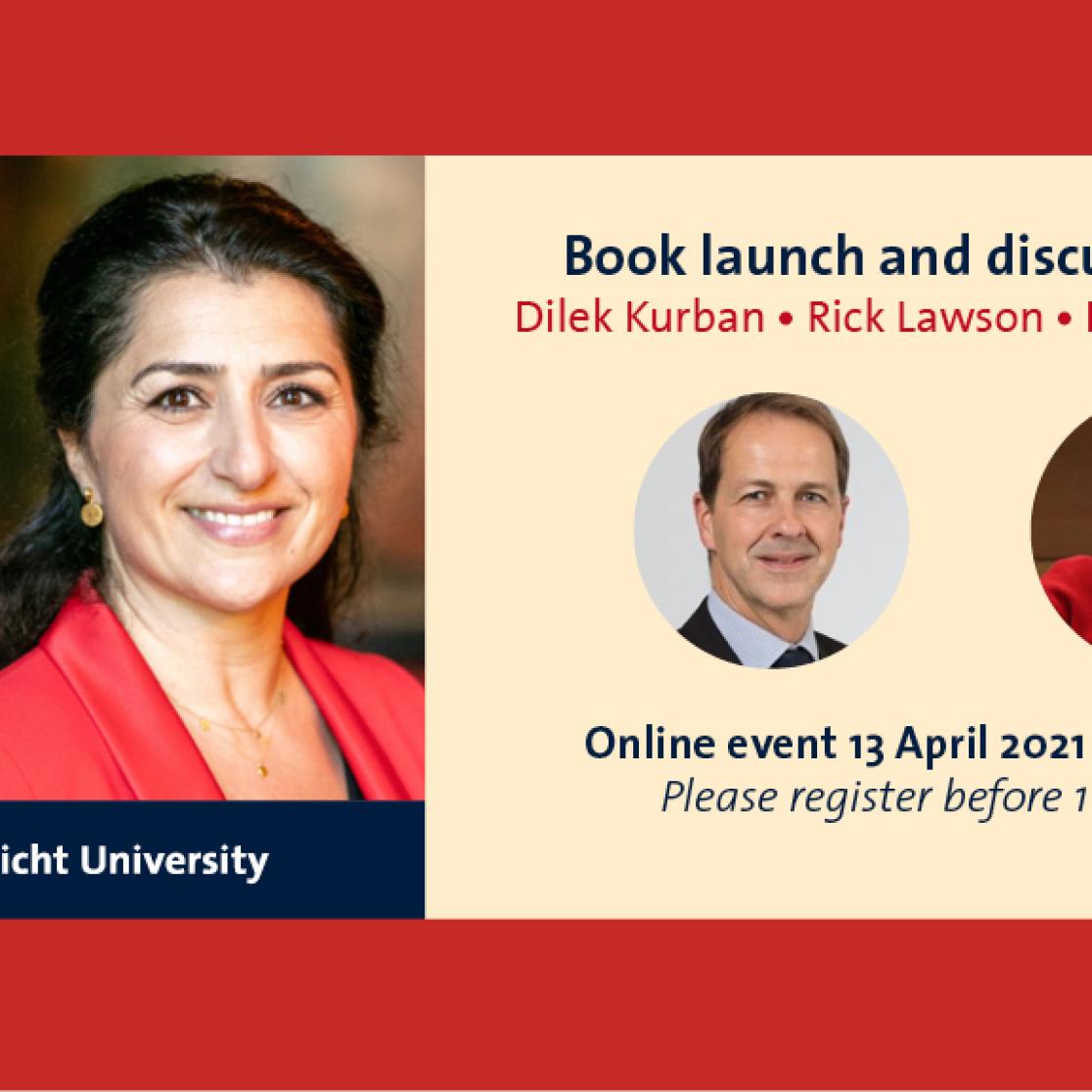How to promote your event
When you are planning an event as a researcher at the Faculty of Law,
one of your first point of contact should be the research communications advisor.
The communication advisor will be your guide in:
-
crafting your message for the event’s target group
-
developing a marketing plan to attract participants
-
determining if livestreaming, live-Tweeting or live-blogging is appropriate during the event
-
developing a post-event communication plan for attendees and interested parties
- deciding which communication channels are most appropriate for reaching your target group

Example of a pre-event teaser to promote a book launch event.
Pre-event communication
| There are many possibilities you can discuss with the research communications advisor for promoting your event. The important thing is to choose what is most effective in reaching your target group. |
Potential UM channels
Online marketing: If appropriate, messages about your event (possibly including images and/or a teaser video) can be placed in:
- LAW news or the Faculty Journal
- direct emails to staff, students, network partners
- UM e-newsletters for students and staff
- event items on the UM website (e.g., UM homepage, Research page, faculty landing page, institute landing page, intranet)
- TV screens at the faculty
Offline marketing: If appropriate, flyers, brochures, reports, posters can be developed to help market your event. The most effective distribution channels for these materials can be discussed with the advisor.
Blog posts: You can promote your event by writing a blog post about it on Law Blogs Maastricht as well as on your personal blog.

Social media: You can write a number of posts, including texts and images, and develop a schedule for posting them to the university/faculty’s social media accounts (Twitter, LinkedIn, etc.) as well as your own.
Potential external channels
- Unique social media accounts for the event: In some cases, it is appropriate to create new social media accounts specifically for the event, usually on Twitter or Facebook. This allows attendees or interested parties to engage with the organisers or presenters beforehand and get updates as soon as event details become available. This is also a great way to facilitate communication after the event has taken place. If UM is the primary host university, the images for the account will use UM branding.
- Unique event hashtags: Unique hashtags can be created for communication about your event and possibly for live-tweeting, especially if it’s a larger event. You can include this in all of your other marketing materials so that potential participants can easily find and share the information you have put out on social media.
- Joint marketing with co-organisers, sponsors and presenters for the event: Much of the marketing material that you develop for the internal channels can also be adapted if necessary and shared with co-organisers, sponsors and presenters for the event.
- Professional organisations: Local, national or international professional organisations are often willing to share information about your event, often through social media or newsletters, if it is relevant to their members.
- Observant: The Observant has readers both inside and outside the university, who often live locally and may be interested in local events.
- Network partners: Information about the event can be shared with relevant network partners of the Faculty of Law.

- Press, media, magazines, newspapers: If suitable, information about the event can be shared via EW, FD, NRC wetenschap, Volkskrant wetenschap or local media like Chapeau or de Limburger.
- Network partners: Information about the event can be shared with relevant network partners of the Faculty of Law.
Communication during the event
| Live-tweeting and live-blogging at events allows you to engage in real-time with event participants as well as interested parties who are not able to make it to the event. |
At some events, someone or multiple people from the event organisation may be dedicated to live-tweeting using the event’s Twitter account. They can even ask the twitter audience if they have questions for the presenters.
Often, the participants themselves are encouraged to live-tweet about the event as it happens. This can dramatically increase the impact of the event, as all of the followers of the live-tweeting participants will also learn about the event. Let participants know if live-tweeting is encouraged or not by sharing that information in the pre-event communications or by posting signs at the event. And don’t forget to share the event hashtags!
For more about live tweeting and blogging, check out this blog post from The Guardian about Live-tweeting at academic conferences: 10 rules of thumb
There are some instances when live-tweeting should be approached with caution.
Particularly with academic conferences, where scholars may present unpublished work or work in progress, you should always check with the presenter if they are okay with you live broadcasting information about their presentation.
Whereas they may be comfortable sharing the information in the context of their entire presentation and with a group of peers, they may not be comfortable with sharing 140-character snippets of their presentation out of context with the entire world.
Post-event communication
| With post-event communication, the focus is on engaging with the participants and providing information that adds value. |
Just remember, it’s all about what they want to know and not necessarily about what you want to communicate.
The following are some of the avenues for post-event communication:
- Share event info through social media: If the presenters give permission, post their presentations to SlideShare. And if you make videos or podcasts of the event, consider uploading them to YouTube. Be sure to include keywords in your title, as YouTube is the second biggest search engine and using keywords can drive traffic to your event videos.
- Make a post-event webpage: If you have a webpage or social media page for the event, you can turn it into a post-event page by adding event highlights, summaries, videos, slides, publication links, a gallery of the best tweets from the event, photos, and any other materials that are available.
- Send a follow-up email: Send a thank you or follow-up email to participants (and to those who registered but did not make it) with highlights and perhaps funny stories or anecdotes of things that happened during the event. The email should also contain links to the post-event page and any other event materials that you have put online, such as videos on YouTube, slides on SlideShare, etc.
- Answer any unanswered questions: If there are any questions from the event that remained unanswered because they required further research, let the participants know you’re committed to their learning needs by answering those questions
- Send out a survey: Create a survey to get feedback and ideas for continued engagement. You can ask for their opinion on event details of the event and, perhaps more importantly, on topics that they would like to know more about. This will help you decide if there is enough interest for continued engagement or a follow-up event. For post-event communication to be effective, you need to add value and send participants information that they are interested in.
- Advertise an upcoming event for the audience: Use your email list, social media page and hashtag to alert the participants about an upcoming event. Maintaining communication means that you have a ready-made group of interested participants if you host another event.
Sources for this guide
|
Please contact f.hoekstra@maastrichtuniversity.nl for questions
regarding support at the UM Faculty of Law